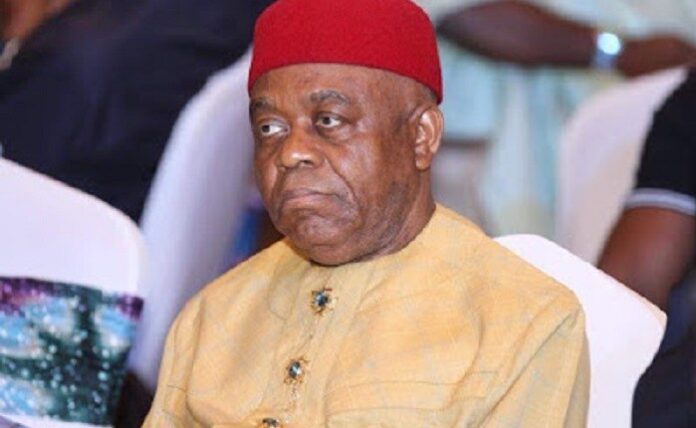A Federal High Court in Abuja has directed the interim forfeiture of ₦228.4 million allegedly connected to Theodore Orji, the former governor of Abia State. This ruling comes amidst allegations of money laundering and misappropriation of public funds during Orji’s tenure as governor and his subsequent role as a senator.
The interim order, issued by Justice Emeka Nwite, follows an ex parte motion presented by the Economic and Financial Crimes Commission (EFCC). According to EFCC counsel, Fadila Yusuf, the funds are suspected to be proceeds of unlawful activities and were discovered in an account under the name of Effdee Nigeria Ltd.
Court’s Directive
In his ruling, Justice Nwite instructed the EFCC to publicize the forfeiture order both on its website and in a prominent national newspaper. This publication, he emphasized, would allow interested parties to contest the forfeiture within 14 days. A follow-up hearing is scheduled for February 3, 2025.
“This court hereby grants an interim order for the forfeiture of the sum of ₦228,497,773.12 suspected to be proceeds of unlawful activities,” the judge stated.
EFCC’s Case Against Orji
The EFCC has alleged that Effdee Nigeria Ltd., a waste management firm, was used as a front to divert state funds under the administration of Theodore Orji. Detailing the allegations, EFCC litigation officer Tahir Ahmed stated, “Effdee Nigeria Ltd conspired with Senator Theodore Ahamefule Orji, his family members, and some officials in his administration to launder funds belonging to the Abia State government.”
Ahmed also disclosed that the company’s bank account had been manipulated to receive substantial inflows from government agencies, culminating in the disputed balance of ₦228.4 million.
Keystone Bank’s Role
The investigation revealed that Keystone Bank played a pivotal role in the alleged scheme. According to Ahmed, the bank’s divisional head in Abia State, Austin Akuma, collaborated with Erondu Uchenna Erondu, a key aide to Orji, to facilitate these transactions.
“Akuma confessed that he and Erondu agreed that Effdee Nigeria Ltd.’s account would serve as a conduit for funds from Abia State government accounts,” Ahmed told the court.
Further analysis of the account reportedly uncovered multiple transactions originating from various Abia State agencies, raising red flags about the legitimacy of the funds.
History of Allegations
This is not the first time Theodore Orji and his family have faced corruption allegations. In August 2021, the EFCC questioned Orji and his son over accusations of embezzling state resources during his two-term governorship from 2007 to 2015.
Reports indicate that during his administration, billions of naira allocated for public projects allegedly went unaccounted for. Critics have often cited the dilapidated infrastructure in Abia State as evidence of mismanagement during Orji’s tenure.
Orji transitioned to the Senate in 2015, representing Abia Central District until 2023. His time in office, however, has been overshadowed by ongoing allegations of financial impropriety.
Public Reactions
The court’s decision has reignited debates about corruption and accountability among public officials in Nigeria. Transparency advocates have applauded the EFCC’s efforts, emphasizing the importance of holding former leaders accountable.
“This ruling is a step in the right direction. It shows that no one is above the law,” said a representative from the Civil Society Legislative Advocacy Centre (CISLAC).
Conversely, supporters of Orji argue that the case may be politically motivated. “We must not allow anti-graft agencies to become tools for witch-hunting,” an Abia-based political analyst stated.
What’s Next?
The interim forfeiture order provides an opportunity for any party with a legitimate claim to the funds to present their case in court. Failure to do so within the stipulated 14 days could lead to the permanent forfeiture of the ₦228.4 million to the Nigerian government.
Meanwhile, the EFCC is reportedly intensifying its investigation into the matter, with indications that more charges could be filed against those implicated.
Broader Implications
This case highlights Nigeria’s ongoing battle against corruption, particularly among political elites. Despite numerous anti-corruption campaigns and initiatives, critics argue that high-profile cases often stall or fail to lead to convictions.
“The interim forfeiture order is significant, but the real test lies in whether this case leads to prosecution and recovery of stolen assets,” said an anti-corruption expert based in Abuja.

